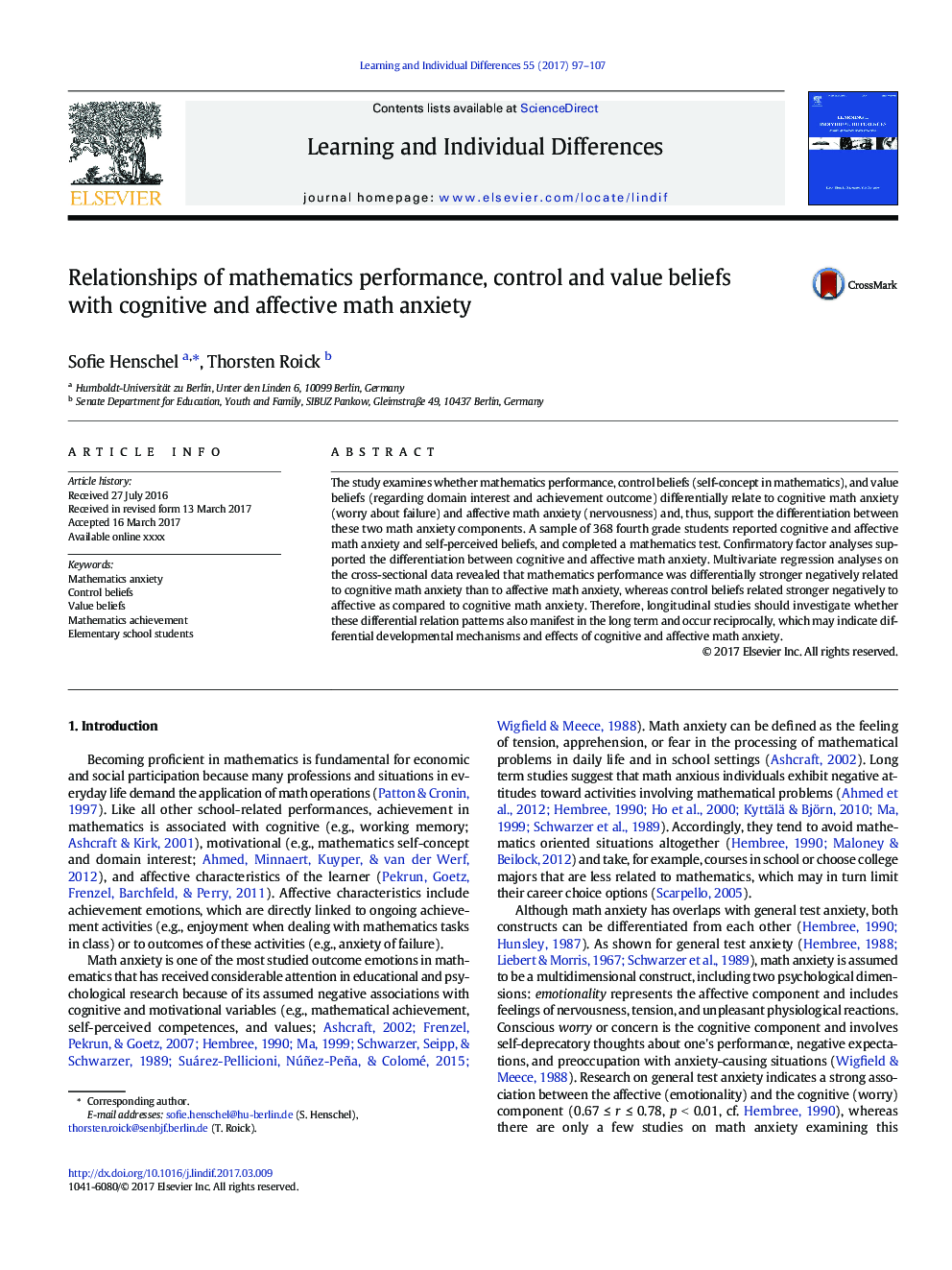| کد مقاله | کد نشریه | سال انتشار | مقاله انگلیسی | نسخه تمام متن |
|---|---|---|---|---|
| 4939982 | 1436368 | 2017 | 11 صفحه PDF | دانلود رایگان |
عنوان انگلیسی مقاله ISI
Relationships of mathematics performance, control and value beliefs with cognitive and affective math anxiety
ترجمه فارسی عنوان
روابط عملکرد ریاضیات، باورهای کنترل و ارزش با اضطراب ریاضی شناختی و عاطفی
دانلود مقاله + سفارش ترجمه
دانلود مقاله ISI انگلیسی
رایگان برای ایرانیان
کلمات کلیدی
اضطراب ریاضیات، باورهای کنترل، باورهای ارزشمند، دستاوردهای ریاضی، دانش آموزان ابتدایی،
ترجمه چکیده
این مطالعه به بررسی اینکه آیا عملکرد ریاضی، باورهای کنترل (خودپنداره در ریاضیات) و اعتقادات ارزش (در مورد منافع دامنه و نتیجه دستاوردهای) به طور اختلاف به اضطراب ریاضی شناختی (نگرانی در مورد شکست) و اضطراب ریاضی عاطفی (نگرانی) تمایز بین این دو مضمون اضطراب ریاضی را پشتیبانی می کند. نمونه ای از 368 دانش آموز چهارم دانشجویان، اعتقادات شناختی و عاطفی ریاضی و اعتقادات خود را درک کردند و آزمون ریاضی را تکمیل کردند. آنالیز فاکتور تاییدیه تمایز بین اضطراب ریاضی شناختی و عاطفی را پشتیبانی می کند. تجزیه و تحلیل رگرسیون چند متغیر بر روی داده های مقطعی نشان داد که عملکرد ریاضی با افزایش اضطراب ریاضی شناختی منفی نسبت به اضطراب ریاضی شناختی موثر است، در حالی که اعتقادات کنترل منفی نسبت به اضطراب ریاضی شناختی قوی تر به نظر می رسد. بنابراین، مطالعات طولی باید بررسی کند که آیا این الگوهای ارتباطی دیفرانسیل در طولانی مدت آشکار می شوند و هم متقابلی ایجاد می کنند، که ممکن است نشان دهنده مکانیزم های توسعه دیفرانسیل و اثرات اضطراب ریاضی شناختی و عاطفی باشد.
موضوعات مرتبط
علوم انسانی و اجتماعی
روانشناسی
روانشناسی رشد و آموزشی
چکیده انگلیسی
The study examines whether mathematics performance, control beliefs (self-concept in mathematics), and value beliefs (regarding domain interest and achievement outcome) differentially relate to cognitive math anxiety (worry about failure) and affective math anxiety (nervousness) and, thus, support the differentiation between these two math anxiety components. A sample of 368 fourth grade students reported cognitive and affective math anxiety and self-perceived beliefs, and completed a mathematics test. Confirmatory factor analyses supported the differentiation between cognitive and affective math anxiety. Multivariate regression analyses on the cross-sectional data revealed that mathematics performance was differentially stronger negatively related to cognitive math anxiety than to affective math anxiety, whereas control beliefs related stronger negatively to affective as compared to cognitive math anxiety. Therefore, longitudinal studies should investigate whether these differential relation patterns also manifest in the long term and occur reciprocally, which may indicate differential developmental mechanisms and effects of cognitive and affective math anxiety.
ناشر
Database: Elsevier - ScienceDirect (ساینس دایرکت)
Journal: Learning and Individual Differences - Volume 55, April 2017, Pages 97-107
Journal: Learning and Individual Differences - Volume 55, April 2017, Pages 97-107
نویسندگان
Sofie Henschel, Thorsten Roick,
